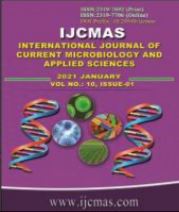


 National Academy of Agricultural Sciences (NAAS)
National Academy of Agricultural Sciences (NAAS)

|
PRINT ISSN : 2319-7692
Online ISSN : 2319-7706 Issues : 12 per year Publisher : Excellent Publishers Email : editorijcmas@gmail.com / submit@ijcmas.com Editor-in-chief: Dr.M.Prakash Index Copernicus ICV 2018: 95.39 NAAS RATING 2020: 5.38 |
The farmers in the tribal districts of Gajapati and Rayagada have been cultivating cotton as a commercial crop over the years to support their livelihood. Adoption of appropriate crop management practices helps to minimize the deletorious effects of production factors and leads to improvement in cotton yields. A study was undertaken on 240 cotton growers from four blocks of the two districts. Data was collected personally on the extent of adoption of standard crop management practices through a semi-structured schedule and analysed using appropriate statistical methods. It was observed that the respondents largely adopted the basic cotton cultivation practices recommended. However, deficiencies were observed in levelling, sub-plotting, bunding, adoption of appropriate crop cultivars, application of recommended dose of manures and fertilisers based on soil test, delinting and treatment of seeds, sowing in paired rows, drilling two seeds per pit, 3rd weeding, hoeing and earthing-up at six weeks, hormone application, plant protection measures after 110 days of sowing, picking bolls in the cool hours of morning, picking at 50% bursting of bolls, and avoiding admixtures of leaves. Extension contact, house type, social participation, annual income, farming experience, and aptitude of the respondents significantly influenced adoption of recommended crop management practices. The agricultural extension officials promoting cotton cultivation in these districts have to analyse these factors and take appropriate measures to enrich the knowledge and skills of cotton farmers to enable them to adopt suitable crop management practices to generate more income.
 |
 |
 |
 |
 |